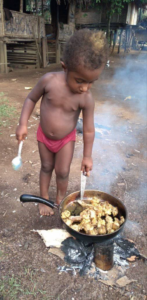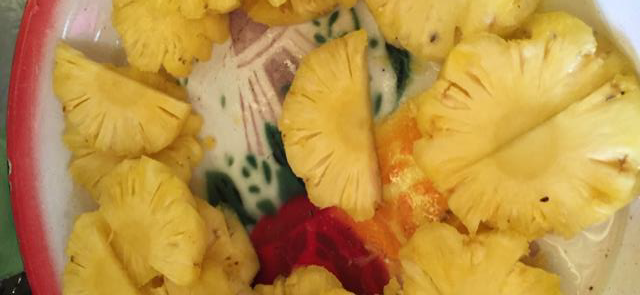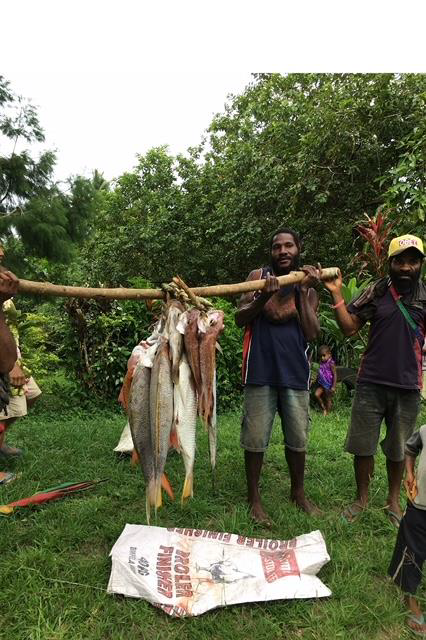I am leaving for PNG in 8 WEEKS – my tickets have been purchased!
I’m still fundraising! Your contribution will help me assist with the Bible dedication for the Apal people (a once-in-a-lifetime opportunity!!) and “finish my time” in Papua New Guinea (PNG).
If you do not currently support me, or have yet to join my team, now would be a wonderful time to start! If you do support me, please consider raising your monthly donation or sending an additional one-time donation. All gifts, big and small are appreciated and tax deductible! Click here to give.
Preparing food in Papua New Guinea:
Food preparation in PNG villages is a tad different from preparing it in America. Last week I wrote about “gathering” food (bananas that Robbie and my village mama had harvested). Once food items are gathered, the mama will bring the items to her home, clean it, cut it up, cook it, and clean up afterwards – the “cleaning up” part involves collecting the plates, utensils, pots and pans and carrying them (on their head) to the river. I will talk more about this in a moment.

But before I go any further, I want to show you something that is natural to see in villages. I don’t remember how old this little darling is, but she was cooking something when I was visiting a village. I thought it was bananas, but maybe it was chicken. It’s been a long time..

This is my village mama’s house – we will not be able to go to my Mawan. It is not safe. I am really disappointed!! But they know better than I do. Hopefully a lot of my village family will come to town to say “lukim yu gen” (see you again). I may not see them again until heaven, but maybe God will allow me to go back to PNG again.

When I lived in Mawan in 2014, as part of my jungle training, we cooked just under the edge of the house with no walls. There was no separate haus kuk (“house cook” – kitchen). We sat on a log while cooking over the open fire. Now they have a separate building for cooking. The only thing that is done inside their homes is sleeping. My village brother, aunt and cousin are in this photo.

This is my village mama and me wearing the matching meri blouses that she sewed for us. We are about the same age, but she is my mama because (PNG culture, and) she knows 100% more than I EVER will! She is amazing!! I can’t wait to see her!!

As I stated earlier, after a meal all items needing to be washed are taken to the river. Starting (way) up stream, the men bathe, a little further downstream the women/children bathe, then downstream a tad more we wash our clothes, then… the dishes are washed a little more downstream. Yep! I thought it was backwards too, and I worried about the dishes even getting even remotely clean knowing what I was putting in the water to wash (we sweat all.day.long, and we stink!). They told me that the water ran fast enough to make it ok – I trusted God and only got sick one time.

Kids would follow us white gals to the water to watch us wash, ha-ha! We were like Velcro – the farther we walked, the more kids followed. It was a hoot! They love me so well – the young ladies even built a pool for me to wash in. When I sat down, it came up over my shoulders. It was incredibly cool and refreshing – there was only one incident with a snake in the water. The rest of the time I enjoyed a refreshing/cool bath with beautiful blue dragonflies remaining near me on the bushes.

Here are examples of the foods that I ate in any given village (but these are all from my village, Mawan). This meal is tulip leaves, beans, and maybe some aibika. The things that look like bananas are a yummy starchy food called pit pit. It was the first thing I learned to cook in jungle training in 2014. It looks like corn on the cob when it is picked. We put the entire stalk over the fire. It needs salt, but really nothing else to be yummy.

This is chicken, a spinach-like leafy veggie, carrot, taro (looks like potato), and beans with broth, topped off with fresh pineapple

In my mind, there is really nothing to compare with the wonderful pineapples we get there! I had them growing in my yard – along with mango and lots of bananas!

We often saw a man walking down the road by my home (one block from the South Pacific Ocean) with more than one octopus that he had caught that day. These particular guys were on our way home from a dedication. We bought (and thoroughly enjoyed) some of their fish!
I hope you have enjoyed this “taste” of my life in Papua New Guinea – pun intended, ha! Thanks for taking a short tour! I cannot wait to return and see my PNG family and friends!
Thank you for enabling me to do this once-in-a-lifetime trip to help the Apal people receive and celebrate their first-ever Bible in their own language! I cannot do this without you. It is my hope that if I can do this well, that I will be invited back to help the PNG branch for other dedications. I would LOVE to be their point person to care for expat visitors for big events like this one!
Remember – I am still fund raising
Here is how you can give here.
Next week I might focus on a dedication held in another part of the world, but for now I will post another from PNG. I attended this Mbore dedication.
